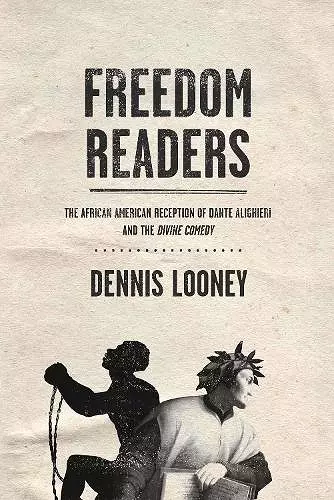Freedom Readers
The African American Reception of Dante Alighieri and the Divine Comedy
Format:Paperback
Publisher:University of Notre Dame Press
Published:11th Mar '11
Currently unavailable, and unfortunately no date known when it will be back

Freedom Readers: The African American Reception of Dante Alighieri and the Divine Comedy is a literary-historical study of the many surprising ways in which Dante Alighieri and the Divine Comedy have assumed a position of importance in African American culture. Dennis Looney examines how African American authors have read, interpreted, and responded to Dante and his work from the late 1820s to the present.
In many ways, the African American reception of Dante follows a recognizable narrative of reception: the Romantic rehabilitation of the author; the late-nineteenth-century glorification of Dante as a radical writer of reform; the twentieth-century modernist rewriting; and the adaptation of the Divine Comedy into the prose of the contemporary novel. But surely it is unique to African American rewritings of Dante to suggest that the Divine Comedy is itself a kind of slave narrative. Only African American “translations” of Dante use the medieval author to comment on segregation, migration, and integration. While many authors over the centuries have learned to articulate a new kind of poetry from Dante’s example, for African American authors attuned to the complexities of Dante’s hybrid vernacular, his poetic language becomes a model for creative expression that juxtaposes and blends classical notes and the vernacular counterpoint in striking ways. Looney demonstrates this appropriation of Dante as a locus for black agency in the creative work of such authors as William Wells Brown, the poet H. Cordelia Ray, Richard Wright, Ralph Ellison, Amiri Baraka, Gloria Naylor, Toni Morrison, and the filmmaker Spencer Williams.
Looney fruitfully suggests that we read Dante’s Divine Comedy with its African American rewritings in mind, to assess their effect on our interpretation of the Comedy and, in turn, on our understanding of African American culture.
“Looney’s trailblazing book opens a new and important page in Dante Studies and African American Studies, as well as American Studies at large. Thanks to this solid research, scholars of these fields will now look at each other’s works with a growing sense of commonality.” —Symposium
“Dennis Looney examines the influence and reception of Dante’s Commedia in African American literature and film from the late 1920s to the present. . . . This is primarily a study of black American literature, but it does offer a fascinating insight into the importance of Dante as a lens through which to read these texts, and a figure in the African American cultural imagination.” —Medium Aevum
“Both for the scholarship it offers and for the work it urges others to do, Dennis Looney’s Freedom Readers is a crucial contribution to African American studies, to American studies more broadly, and to the continuing saga of Dante’s reception. . . . Freedom Readers will . . . have a powerful influence in American literary studies for some years to come.” —Renaissance Quarterly
“[Dennis Looney’s] subject of Dante’s African American reception has been somewhat neglected up to now, but offers some striking evidence of his relevance to the nineteenth and twentieth centuries. Looney’s major focus is on the novels Invisible Man by Ralph Ellison and The System of Dante’s Hell by LeRoi Jones (later known as Amiri Baraka), both at various levels autobiographical; he also covers a wide range of writing, and some film, from the 1860s to Toni Morrison and contemporary rap music.” —Times Literary Supplement
- Winner of American Association of Italian Studies Book Award: General 2011 (United States)
ISBN: 9780268033866
Dimensions: 229mm x 152mm x 17mm
Weight: 439g
296 pages